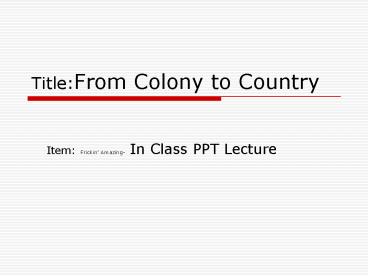Title:From Colony to Country PowerPoint PPT Presentation
1 / 21
Title: Title:From Colony to Country
1
TitleFrom Colony to Country
- Item Frickin Amazing- In Class PPT Lecture
2
From Colony to Country
- Objectives
- Understand what factors led to the American
Revolution - Understand the enlightenment ideas and how they
impacted American ideals
3
(No Transcript)
4
British Settlement
- Eastern North America
- Jamestown- 1st Successful colony saved by tobacco
- Regional Differences create different cultures in
North and South - Colonies self-run Salutary Neglect
5
The Policy of Mercantilism
- 1. The concept that the colony existed for the
good of the mother country. - 2. The colonies paid taxes, sent over raw
materials and had to purchase all finished good
from the mother country. - 3. The mother country's only obligation was
defense. - 4. England had actually ignored the colonies and
never really collected taxes, a policy called
Salutary Neglect
6
The French and Indian War
7
French and Indian War
- France and Great Britain compete for dominance
- Part of larger war
- Colonist help fight vs. French
- Tried to take Canada
- British win
8
The French and Indian War
- 1. The French and Indian War cost the British a
lot of money. - 2. Following the policy of mercantilism they
abandoned Salutary Neglect by - increasing taxes - Sugar Act, Stamp Act
- increasing control - Proclamation of 1763 (Set a
border at the frontier to increase control) - 3. This was done without consulting the colonists
9
Colonial Reaction
- 1. Cried - "No Taxation Without Representation!"
- 2. Formed the Sons of Liberty
- 3. Tarred and feathered stamp collectors
- 4. Disobeyed the King.
10
The British Response
- 1. Various Punitive and Taxing Acts
- Tea Act, which led to Boston Tea Party
- Quartering Acts - British soldiers lived in the
homes of colonists. - Coercive Acts, which the colonists called the
Intolerable Acts where the Port of Boston was
closed and the Massachusetts charter revoked.
11
Discontent Spreads
- New Rules changed the way the colonists had
operated for nearly 100 years - Affected commerce and freedom
- Continental Congress formed
12
Continental Congress
- 1774- Organized to present issues to King, show
unity of colonies - Sent Olive Branch Petition- Asked king to ease up
on new rules - Meet again- 2nd Continental Congress
- Lexington and Concord happened in before next
meeting
13
2nd Continental Congress
- 1776- Philadelphia
- Purpose was to discuss response of King and
issues - April 1775 Lexington Concord sped up call for
separation - Congress issued Declaration of Independence, July
4th 1776
14
Declaration of Independence
- Written by Thomas Jefferson (mostly)
- Ideas came from Enlightenment thinkers
- Roseau, Locke,Voltaire
- Purpose was to formally declare separation from
King - State reasons why
- Established ideas for new government
15
The Revolution Begins
- 1. The colonists met at the First Continental
Congress and sent a letter to the King attempting
to find peace, he never read it. This was known
as the Olive Branch Petition. - 2. The King sent troops to the Colonies and
battles occurred at Lexington and Concord and
then Bunker Hill. - 3. The Second Continental Congress wrote and
ratified the Declaration of Independence.
16
America and The Enlightenment
17
John Locke
- His writings became the basis for the Declaration
of Independence - He wrote about the natural rights of Life Liberty
and Property. - He also wrote that government was created by
consent of the governed in order to protect these
natural rights. - If the government did not protect these rights he
said that people had the right to rebel and
dissolve the government. - This was the philosophical justification of the
American Revolution.
18
Voltaire
- - His writings became the basis of the 1st
Amendment and Freedom of Speech - - Voltaire once wrote "I may disagree with what
you say, but I will defend till death your right
to say it." This famous quote was widely read and
believed.
19
Baron de Montesquieu
- - His writings became the framework of the much
of the Constitution. - - He wrote about a Separation of powers and
checks and balances that would divide government
into three branches in order to prevent one
branch of government from getting too powerful.
20
Machiavelli Hobbes
- Machiavelli (The Prince)
- Hobbes (Leviathan)
- Endorsed a strong government and in part formed
the basis of federalism.
21
Declaration Activity
- Read through section 1, 2, 4 and 5 carefully for
each of those sections translate the olde English
in your own words (even appropriate slang) - Include a visual representation for each section.
- For section 3- pick three from the 20 complaints
to translate and create a visual for. - In your own words explain why many people say
that section two is the most important section in
all of American history. - Do this in the packet, you can use the back also
- Will be discussing it on Later

